人工智能怎样影响人类的英语作文.doc
人工智能对我们生活的好处和坏处英语作文
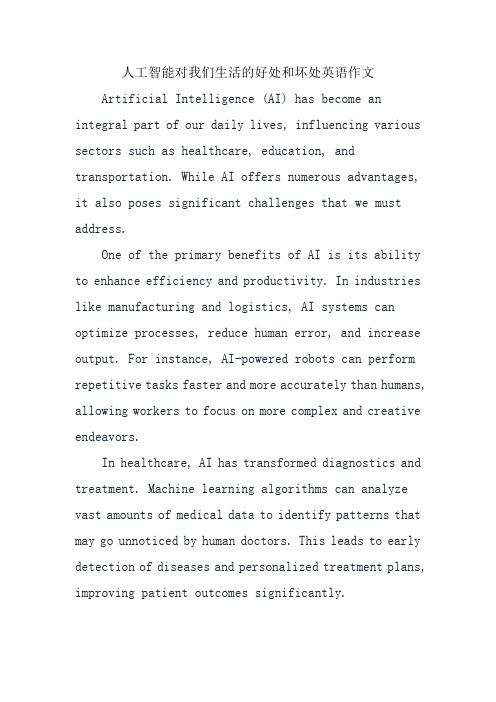
人工智能对我们生活的好处和坏处英语作文Artificial Intelligence (AI) has become an integral part of our daily lives, influencing various sectors such as healthcare, education, and transportation. While AI offers numerous advantages, it also poses significant challenges that we must address.One of the primary benefits of AI is its ability to enhance efficiency and productivity. In industries like manufacturing and logistics, AI systems can optimize processes, reduce human error, and increase output. For instance, AI-powered robots can perform repetitive tasks faster and more accurately than humans, allowing workers to focus on more complex and creative endeavors.In healthcare, AI has transformed diagnostics and treatment. Machine learning algorithms can analyze vast amounts of medical data to identify patterns that may go unnoticed by human doctors. This leads to early detection of diseases and personalized treatment plans, improving patient outcomes significantly.Moreover, AI enhances our daily lives through smart technologies. Virtual assistants like Siri and Alexa help us manage our schedules, control smart home devices, and provide information at our fingertips. These conveniences save us time and make our lives easier.Despite its benefits, AI also presents several drawbacks. One of the most pressing concerns is job displacement. As companies adopt AI technologies, many traditional jobs may become obsolete, leading to unemployment and economic inequality. Workers in sectors like manufacturing and customer service are particularly vulnerable to being replaced by machines.Another concern is the ethical implications of AI. Issues such as data privacy, surveillance, and algorithmic bias have raised alarms about the use of AI in decision-making processes. For instance, biased algorithms can lead to unfair treatment in hiring, lending, and law enforcement, exacerbating existing societal inequalities.Finally, the reliance on AI can undermine human skills and critical thinking. As we become increasinglydependent on technology, there is a risk that we may lose essential problem-solving abilities and creativity, which are crucial in various aspects of life.In conclusion, while artificial intelligence brings remarkable benefits that enhance efficiency and improve our quality of life, it also poses significant challenges that must be managed carefully. Balancing the advantages and drawbacks of AI will be essential as we move forward in an increasingly automated world.中文翻译:人工智能(AI)已经成为我们日常生活中不可或缺的一部分,影响着医疗、教育和交通等各个领域。
人工智能给人类带来的危害英语作文
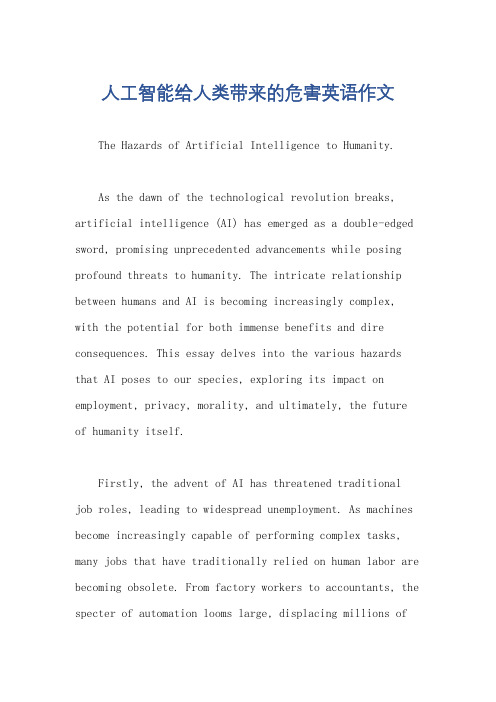
人工智能给人类带来的危害英语作文The Hazards of Artificial Intelligence to Humanity.As the dawn of the technological revolution breaks, artificial intelligence (AI) has emerged as a double-edged sword, promising unprecedented advancements while posing profound threats to humanity. The intricate relationship between humans and AI is becoming increasingly complex, with the potential for both immense benefits and dire consequences. This essay delves into the various hazards that AI poses to our species, exploring its impact on employment, privacy, morality, and ultimately, the future of humanity itself.Firstly, the advent of AI has threatened traditional job roles, leading to widespread unemployment. As machines become increasingly capable of performing complex tasks, many jobs that have traditionally relied on human labor are becoming obsolete. From factory workers to accountants, the specter of automation looms large, displacing millions ofindividuals from their livelihoods. This mass unemployment not only leads to economic instability but also societal unrest, as people struggle to find meaning and purpose in a world where their skills are no longer needed.Moreover, AI poses significant threats to our privacy and data security. As AI systems become more integratedinto our daily lives, they collect vast amounts of personal data, from our online browsing habits to our biometric information. This data is often used for advertising and marketing purposes, but it also leaves us vulnerable to cyber-attacks and identity theft. Furthermore, the centralization.。
人工智能技术对人类社会的影响英语作文
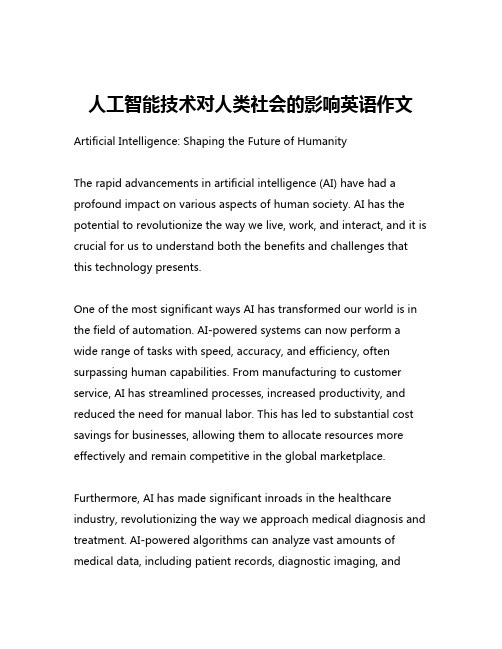
人工智能技术对人类社会的影响英语作文Artificial Intelligence: Shaping the Future of HumanityThe rapid advancements in artificial intelligence (AI) have had a profound impact on various aspects of human society. AI has the potential to revolutionize the way we live, work, and interact, and it is crucial for us to understand both the benefits and challenges that this technology presents.One of the most significant ways AI has transformed our world is in the field of automation. AI-powered systems can now perform a wide range of tasks with speed, accuracy, and efficiency, often surpassing human capabilities. From manufacturing to customer service, AI has streamlined processes, increased productivity, and reduced the need for manual labor. This has led to substantial cost savings for businesses, allowing them to allocate resources more effectively and remain competitive in the global marketplace.Furthermore, AI has made significant inroads in the healthcare industry, revolutionizing the way we approach medical diagnosis and treatment. AI-powered algorithms can analyze vast amounts of medical data, including patient records, diagnostic imaging, andresearch studies, to identify patterns and make more accurate predictions. This has resulted in earlier disease detection, personalized treatment plans, and improved patient outcomes, ultimately enhancing the quality of healthcare and saving lives.In the field of education, AI-powered learning platforms and virtual assistants have the potential to revolutionize the way students learn and interact with educational content. These technologies can personalize the learning experience, adapt to individual needs, and provide immediate feedback, enabling students to progress at their own pace and achieve better learning outcomes. Additionally, AI can assist teachers in grading assignments, providing personalized feedback, and identifying areas where students may need additional support, allowing educators to focus more on the core aspects of teaching.However, the rise of AI also presents significant challenges that must be addressed. One of the primary concerns is the potential for job displacement as AI-powered automation takes over more tasks traditionally performed by humans. This has led to concerns about the future of the workforce and the need for retraining and reskilling programs to help workers adapt to the changing job market.Another critical issue is the ethical implications of AI decision-making. As AI systems become more advanced, there are growing concernsabout their ability to make unbiased and transparent decisions, particularly in areas such as criminal justice, healthcare, and financial services. Ensuring that AI systems adhere to ethical principles and do not perpetuate societal biases is a crucial challenge that must be addressed.Additionally, the increasing reliance on AI has raised concerns about data privacy and security. As AI systems collect and process vast amounts of personal data, there is a need to develop robust data protection and privacy policies to safeguard individual rights and prevent the misuse of sensitive information.Despite these challenges, the potential benefits of AI are undeniable. As we continue to explore and develop this technology, it is essential that we do so in a responsible and ethical manner, ensuring that the advantages of AI are harnessed for the greater good of humanity. By addressing the challenges and maximizing the potential of AI, we can create a future that is more efficient, equitable, and sustainable, ultimately shaping a better world for generations to come.。
ai给人类带来的影响英语作文
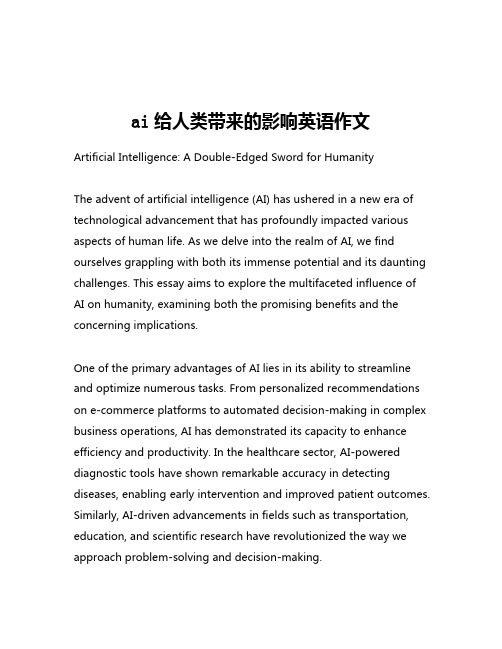
ai给人类带来的影响英语作文Artificial Intelligence: A Double-Edged Sword for HumanityThe advent of artificial intelligence (AI) has ushered in a new era of technological advancement that has profoundly impacted various aspects of human life. As we delve into the realm of AI, we find ourselves grappling with both its immense potential and its daunting challenges. This essay aims to explore the multifaceted influence of AI on humanity, examining both the promising benefits and the concerning implications.One of the primary advantages of AI lies in its ability to streamline and optimize numerous tasks. From personalized recommendations on e-commerce platforms to automated decision-making in complex business operations, AI has demonstrated its capacity to enhance efficiency and productivity. In the healthcare sector, AI-powered diagnostic tools have shown remarkable accuracy in detecting diseases, enabling early intervention and improved patient outcomes. Similarly, AI-driven advancements in fields such as transportation, education, and scientific research have revolutionized the way we approach problem-solving and decision-making.Moreover, AI has the potential to augment human capabilities, empowering individuals to tackle complex problems and explore new frontiers. The integration of AI-powered assistants in our daily lives has made tasks like scheduling appointments, setting reminders, and accessing information more seamless and effortless. This symbiotic relationship between humans and AI has the power to unlock new avenues of creativity, innovation, and personal growth.However, the influence of AI on humanity extends beyond its practical applications. The rise of AI has also raised profound ethical and societal concerns. One of the most pressing issues is the potential displacement of human labor by automated systems. As AI algorithms become more sophisticated and capable of performing a wide range of tasks, there is a growing fear that traditional jobs may become obsolete, leading to widespread unemployment and economic disruption. This challenge requires a comprehensive rethinking of educational systems, workforce training, and social safety nets to ensure a smooth transition and the creation of new job opportunities.Another ethical dilemma surrounding AI is the issue of algorithmic bias and the potential for perpetuating or even exacerbating societal inequalities. AI systems, like any technology, can reflect the biases and prejudices inherent in the data used to train them. This can lead to unfair decision-making in areas such as hiring, lending, andcriminal justice, further marginalizing already disadvantaged communities. Addressing this challenge requires a concerted effort to develop ethical frameworks, transparent algorithms, and inclusive data collection practices to mitigate the risks of AI-driven discrimination.Furthermore, the increasing autonomy and decision-making capabilities of AI systems have raised concerns about the accountability and responsibility for their actions. As AI becomes more integrated into critical infrastructure and high-stakes decision-making processes, questions arise about who should be held accountable for the consequences of AI-driven decisions. This issue becomes particularly complex when AI systems exhibit emergent behaviors that were not explicitly programmed by their creators.In addition to these ethical concerns, the widespread adoption of AI also raises significant privacy and security risks. The collection, storage, and analysis of vast amounts of personal data by AI-powered applications have heightened concerns about data privacy and the potential for misuse or breaches. Cybersecurity threats, such as AI-powered malware and autonomous cyberattacks, further compound the challenges of safeguarding individuals and organizations from malicious actors.Despite these challenges, the influence of AI on humanity is notsolely negative. AI has the potential to contribute to the betterment of society in various ways. For instance, AI-powered systems can be leveraged to address pressing global issues, such as climate change, by optimizing energy consumption, enhancing renewable energy solutions, and improving environmental monitoring and analysis. Additionally, AI can play a crucial role in improving access to education, healthcare, and other essential services, particularly in underserved communities.In conclusion, the influence of AI on humanity is a complex and multifaceted phenomenon. While AI has the capacity to enhance human capabilities, streamline processes, and address global challenges, it also presents significant ethical, societal, and security concerns that must be carefully navigated. As we continue to harness the power of AI, it is imperative that we develop robust governance frameworks, promote ethical AI development, and prioritize the well-being of individuals and communities. Only through a balanced and responsible approach can we ensure that the transformative potential of AI is harnessed for the greater good of humanity.。
人工智能对人类的影响英语作文
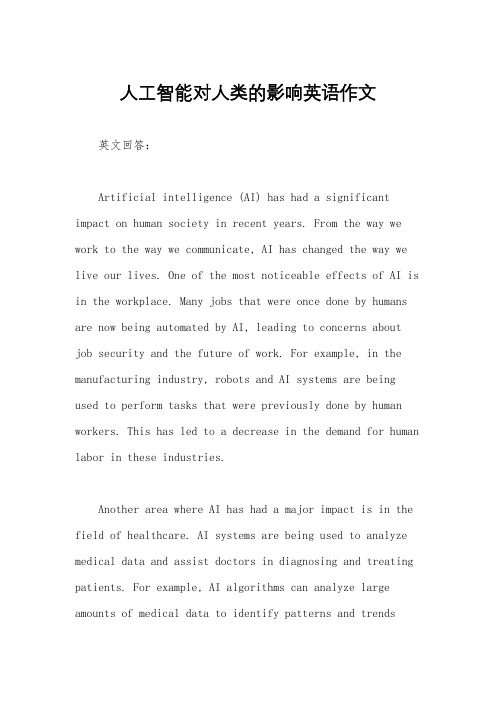
人工智能对人类的影响英语作文英文回答:Artificial intelligence (AI) has had a significant impact on human society in recent years. From the way we work to the way we communicate, AI has changed the way we live our lives. One of the most noticeable effects of AI is in the workplace. Many jobs that were once done by humans are now being automated by AI, leading to concerns about job security and the future of work. For example, in the manufacturing industry, robots and AI systems are being used to perform tasks that were previously done by human workers. This has led to a decrease in the demand for human labor in these industries.Another area where AI has had a major impact is in the field of healthcare. AI systems are being used to analyze medical data and assist doctors in diagnosing and treating patients. For example, AI algorithms can analyze large amounts of medical data to identify patterns and trendsthat may not be apparent to human doctors. This can lead to more accurate diagnoses and better treatment plans for patients.In addition to the workplace and healthcare, AI has also changed the way we interact with technology. Virtual assistants like Siri and Alexa use AI to understand and respond to human voice commands, making it easier for us to access information and control our devices. AI-powered recommendation systems also influence our daily lives, such as the personalized recommendations we receive on streaming services like Netflix and Spotify.Overall, the impact of AI on human society is undeniable. While AI has the potential to improveefficiency and make our lives easier, it also raises important ethical and social questions. As AI continues to advance, it is important for us to consider theimplications of this technology and how it will shape the future of humanity.中文回答:人工智能(AI)近年来对人类社会产生了重大影响。
人工智能对人类的影响英语作文
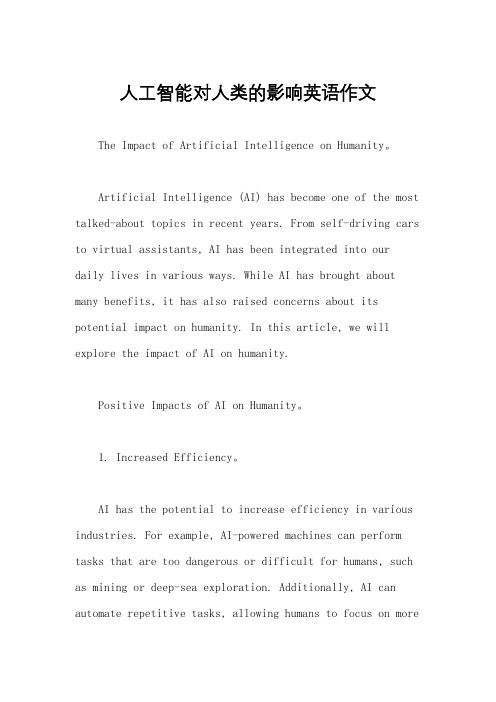
人工智能对人类的影响英语作文The Impact of Artificial Intelligence on Humanity。
Artificial Intelligence (AI) has become one of the most talked-about topics in recent years. From self-driving cars to virtual assistants, AI has been integrated into ourdaily lives in various ways. While AI has brought about many benefits, it has also raised concerns about its potential impact on humanity. In this article, we will explore the impact of AI on humanity.Positive Impacts of AI on Humanity。
1. Increased Efficiency。
AI has the potential to increase efficiency in various industries. For example, AI-powered machines can perform tasks that are too dangerous or difficult for humans, such as mining or deep-sea exploration. Additionally, AI can automate repetitive tasks, allowing humans to focus on morecomplex and creative work.2. Improved Healthcare。
高中英语作文《人工智能对人类生活的影响》

高中英语作文《人工智能对人类生活的影响》The Impact of Artificial Intelligence on Human LifeIn recent years, artificial intelligence (AI) has become an increasingly important part of our daily lives.From virtual assistants to self-driving cars, AI is rapidly changing the way we live and work.In this essay, we will explore the various ways in which AI is impacting human life.First and foremost, AI has greatly improved the efficiency of various industries.For example, in the healthcare industry, AI-powered machines can now perform surgeries with high precision, reducing the risk of human error and improving patient outcomes.Similarly, in the manufacturing industry, AI-driven robots can assemble products at a much faster rate than humans, thereby increasing productivity.Moreover, AI has revolutionized the way we communicate.Virtual assistants like Siri, Alexa, and Google Assistant have made our lives much easier by handling various tasks, such as setting reminders, playing music, and providing weather updates.Additionally, AI-powered chatbots have become increasingly popular in customer service, providing instant and accurate responses to customer queries.In the education sector, AI has the potential to personalize learning experiences for students.Intelligent tutoring systems can adapt to the learning pace and preferences of individual students, providing personalized feedback and guidance.This not only enhances studentengagement but also improves learning outcomes.However, the impact of AI on human life is not limited to these positive aspects.There are also concerns regarding the potential loss of jobs due to automation.As AI and机器人技术不断进步, many traditional jobs are being replaced by machines, leading to concerns about unemployment and income inequality.Furthermore, there are ethical considerations surrounding AI.With the ability to collect and analyze vast amounts of data, AI systems can potentially invade privacy and perpetuate biases if not properly regulated.It is crucial for developers and policymakers to address these ethical concerns and ensure that AI is used responsibly.In conclusion, artificial intelligence has brought about significant changes in human life.From improving efficiency in industries to transforming communication and education, AI has the potential to enhance various aspects of our lives.However, it is important to address the challenges and ethical considerations associated with AI to ensure a balanced and sustainable future.As we continue to embrace AI technology, let us strive for a world where it benefits humanity as a whole.。
人工智能技术对人类社会的影响英语作文
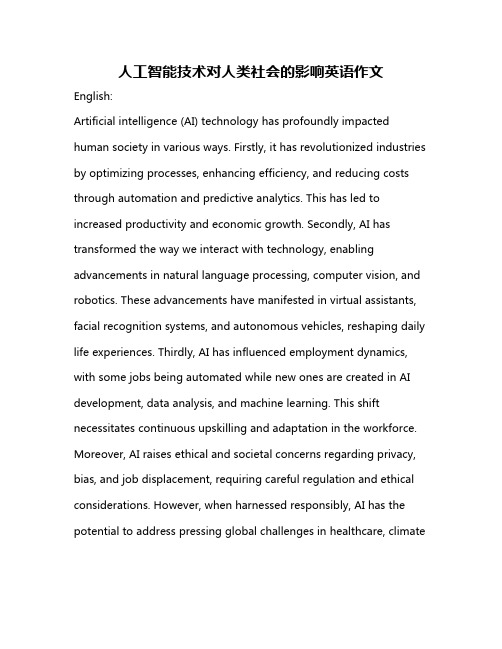
人工智能技术对人类社会的影响英语作文English:Artificial intelligence (AI) technology has profoundly impacted human society in various ways. Firstly, it has revolutionized industries by optimizing processes, enhancing efficiency, and reducing costs through automation and predictive analytics. This has led to increased productivity and economic growth. Secondly, AI has transformed the way we interact with technology, enabling advancements in natural language processing, computer vision, and robotics. These advancements have manifested in virtual assistants, facial recognition systems, and autonomous vehicles, reshaping daily life experiences. Thirdly, AI has influenced employment dynamics, with some jobs being automated while new ones are created in AI development, data analysis, and machine learning. This shift necessitates continuous upskilling and adaptation in the workforce. Moreover, AI raises ethical and societal concerns regarding privacy, bias, and job displacement, requiring careful regulation and ethical considerations. However, when harnessed responsibly, AI has the potential to address pressing global challenges in healthcare, climatechange, and education, offering solutions that were previously unimaginable.中文翻译:人工智能(AI)技术以多种方式深刻影响着人类社会。
- 1、下载文档前请自行甄别文档内容的完整性,平台不提供额外的编辑、内容补充、找答案等附加服务。
- 2、"仅部分预览"的文档,不可在线预览部分如存在完整性等问题,可反馈申请退款(可完整预览的文档不适用该条件!)。
- 3、如文档侵犯您的权益,请联系客服反馈,我们会尽快为您处理(人工客服工作时间:9:00-18:30)。
人工智能怎样影响人类的英语作文人工智能怎样影响人类的英语作文篇1The progress of artificial intelligence. Speed is amazing, the future we will start to work side-by-side with artificial intelligence.AlphaGo fire, five one hundred million people watching man-machine war , in the end it depends on the technical advantage of big data and deep learning in a 4-1 winners posture tell people, to artificial intelligence is no longer just the scene in the movie, but in the real world there is another round of industrial revolution, however, this changes make many people feel scared, at that time all kinds of artificial intelligence threats to the human voice, according to the British science association entrusted network research firm YouGov, according to a survey of about 36% of people think that the rise of artificial intelligence technology will pose a threat to human long-term survival. People in all kinds of artificial intelligence can bring big Bob unemployment is deeply concerned about the discourse, but also in such a tough AlphaGo will be malicious use worrying on such issues.人工智能.的进步速度是惊人的,未来我们将开始与人工智能并肩工作。
AlphaGo火了,五场亿人围观的人机大战,最终它依托大数据与深度学习的技术优势以4:1的胜利者姿态告诉人们,人工智能真的来了,不再只是电影中的场景,而是现实世界里正在上演的又一轮产业变革,然而这种变革让不少人感到惶恐,一时间各种人工智能威胁人类的声音铺天盖地,据英国科学协会委托网络调研公司YouGov进行的一项调查显示,大约36%的人认为人工智能技术的兴起会对人类长期生存构成威胁。
人们在各种人工智能会带来大波失业潮的言论中深感忧虑,同时也在如此强悍的AlphaGo会不会被恶意利用等问题上担心不已。
人工智能怎样影响人类的英语作文篇2人工智能最近,一款叫阿尔法狗的人工智能程序文明了全世界,因为它战胜了世界围棋冠军李世石。
这也引发了一些社会问题,人工智能将何去何从?一方面有些人认为人工智能能够造福世界,使我们的世界变得更加美好,是人们的生活更加便利、幸福。
也有一部分人觉得人工智能发展下去会导致失控,使得机器人反过来统治人类,人类文明恐遭灭绝。
我认为,人工智能既然是人类发明出来的,人类就有责任并且有能力去控制它,因此不存在人工智能自己脱离人类的情况,或许那只是谣言。
那么问题在哪里?该领域是高技术产业,甚至有一些涉及了机密的问题。
那么很大程度上可能就涉及到科学家自身的问题了。
有的时候人一旦拥有了权力就会难以控制人性的弱点,使手上拥有的技术、权力成为自己为所欲为的工具。
我希望我们的生活能够因为人工智能变得更美好而不是更黑暗。
Recently, an artificial intelligence program called alpha dog civilization around the world, because of its victory over the world go champion lee se-dol.This also caused some social problems, artificial intelligence will go?On the one hand, some people think that artificial intelligence can benefit the world, to make our world a better place, is the life of people more convenient and happiness. Also some people think that artificial intelligence development can lead to out of control, and makes the robot, in turn, control human, human civilization will be destroyed.I think, since human beings invented is the artificial intelligence, human beings have the responsibility and have the ability to control it, so there is no artificial intelligence yourself from the situation of human,Maybe it s just rumors.So where is the problem?This area is high technology industry, and even there are some problems involving the confidential.So largely might involve problems of its own.Sometimes people will difficult to control once you have the power, the weakness of human power of the hand with technology, be their own tools as they pleased.I hope our life can be a better place because of artificial intelligence rather than darkness.人工智能怎样影响人类的英语作文篇3Nowadays, with the rapid development of information technology, internet and electronic commerce have been very popular in our daily lives. For example, it is fashionable for youngsters to purchase daily essentials, such as books, clothes, electrical equipment, on some famous website, likeTaobao, EBay and Alibaba, through many courier companies. As we all known, online shopping has many advantages. Firstly, online shopping is more convenient than traditional means. We can find a shop with so many goods that we may favor, while all these just need clicking our mouse and typing-in the key word of what we want to find. And it also saves our a great some of time. Secondly, more choices than real store are another attraction to customers. Online shopping can provide massinformation about products which can be suit for customer s needs, tastes, and preferences. Thirdly, as without traditional warehouses and retail shops, online shopping has can make us gain lower costs and prices. However, in spite of its advantages, we can t turn a blind eye to itsdisadvantages. Obviously, quality problem is its first disadvantage.Customers always buy fake commodities which are not described as online shops. In addition, it s troublesome and annoying for us to make a change when they are not satisfied with what we bought online. The seconddisadvantage is security issues. When we shop online, we need pay for the commodities by electronic payments, but hackers can invade ourcomputers and steal our information, this is not safe for online shopping.如今,随着信息技术的快速发展,互联网和电子商务已经非常受欢迎的在我们的日常生活中。
